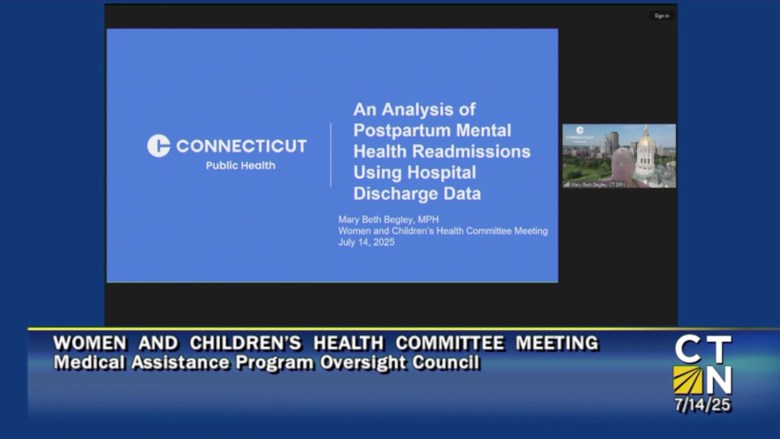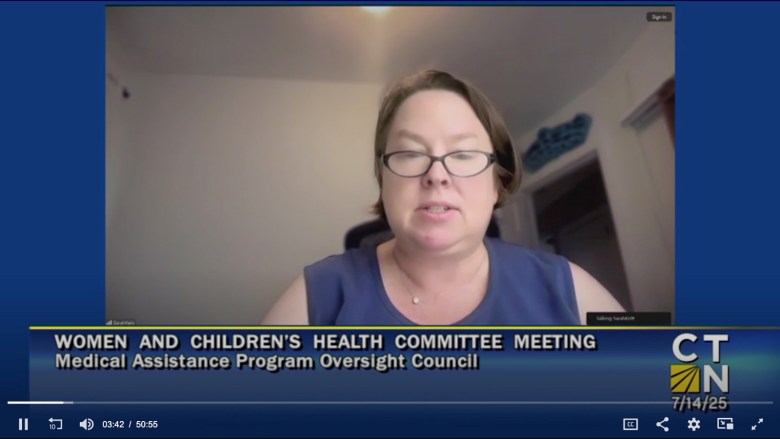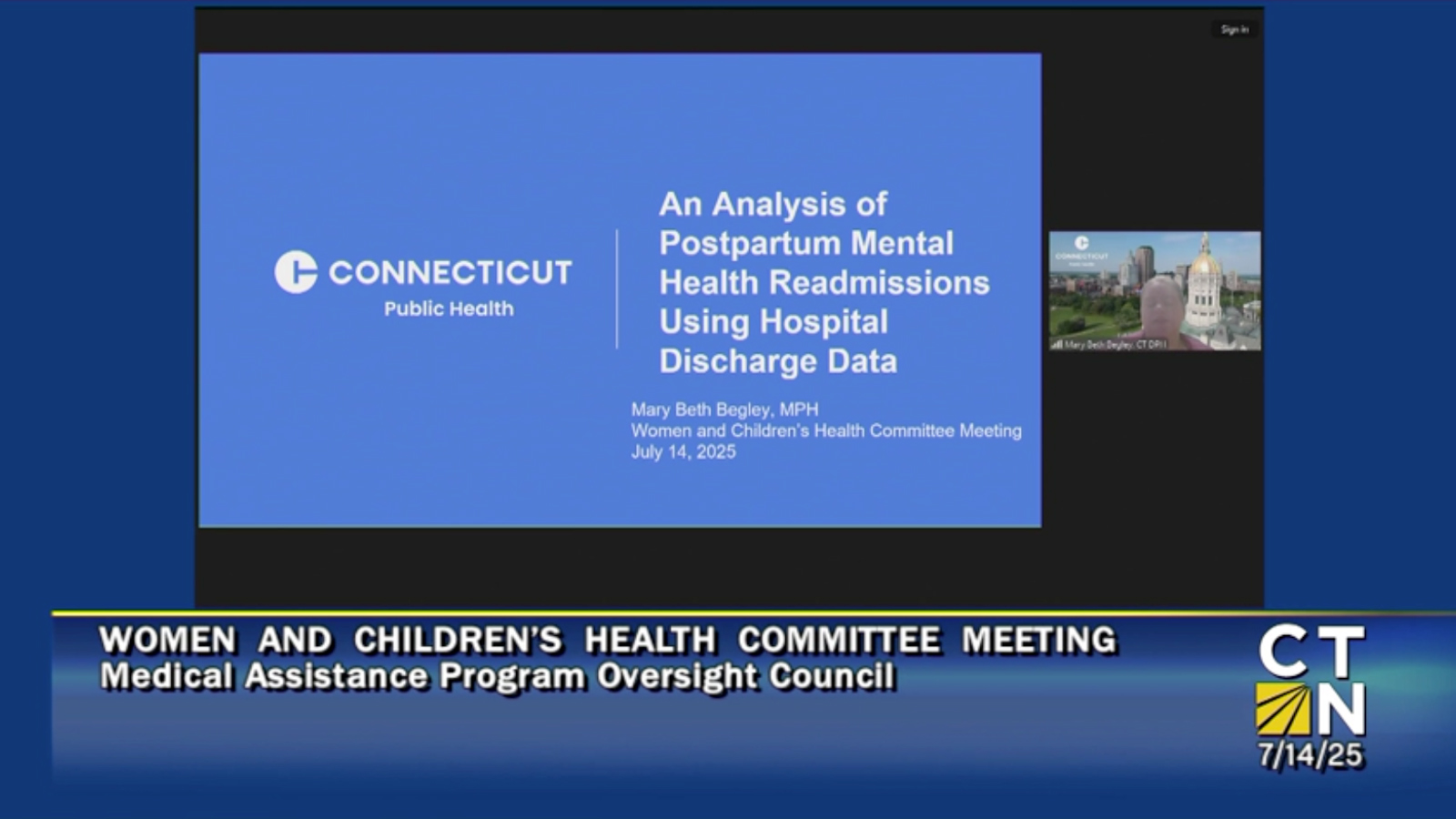 Mary Beth Begley, a maternal and child health epidemiology fellow at the Connecticut Department of Public Health, speaks with her screen shared during a virtual meeting of the Women’s and Children’s Health Committee meeting on Monday, July 14, 2025. Credit: Screengrab / CT-N
Mary Beth Begley, a maternal and child health epidemiology fellow at the Connecticut Department of Public Health, speaks with her screen shared during a virtual meeting of the Women’s and Children’s Health Committee meeting on Monday, July 14, 2025. Credit: Screengrab / CT-N
More than half of Connecticut mothers hospitalized for postpartum menta health emergencies had no documented mental health condition at the time of delivery, according to a new state analysis that points to serious gaps in screening and follow-up care.
Mary Beth Begley, a maternal and child health epidemiology fellow at the Connecticut Department of Public Health, said according to the analysis, hospital discharge records from 2016 through 2023 indicated that 5,555 women — or 2.4% of all new mothers in the state during that period — were hospitalized at least once for a mental health-related issue in the year following childbirth. Of those women, 56% had no documented diagnosis in their delivery records, raising concerns about how many mothers are slipping through the cracks until symptoms become severe enough to warrant emergency care.
“These women may never have been screened. They may have never gotten a formal diagnosis. They’re falling through the cracks,” Begley said. “We need universal screening throughout pregnancy, postpartum care, and especially at well-child visits.”
Anxiety and depression were the leading reasons for postpartum readmission, and the majority of hospitalizations occurred in emergency departments rather than through scheduled or preventative care. Readmission rates were highest among younger mothers, particularly those between ages 15 and 19. Women relying on public insurance such as Medicaid or Medicare also experienced higher rates, as did those identifying as American Indian, Alaska Native, Black, or Hispanic. In contrast, Asian mothers had the lowest reported rates of postpartum mental-health hospitalizations.
While Begley acknowledged some limitations in the data, including possible gaps in how hospital systems documented diagnoses or linked patient records, she emphasized that the findings reflect an urgent need to strengthen mental health services and screening across the perinatal period.
The data was discussed during a virtual meeting of the General Assembly’s Women’s and Children’s Health Committee.
 Rep. Sarah Keitt, D-Fairfield, speaking during a virtual meeting of the Women’s and Children’s Health Committee meeting on Monday, July 14, 2025. Credit: Screengrab / CT-N
Rep. Sarah Keitt, D-Fairfield, speaking during a virtual meeting of the Women’s and Children’s Health Committee meeting on Monday, July 14, 2025. Credit: Screengrab / CT-N
Alongside the maternal health presentation, committee co-chair Rep. Sarah Keitt, D-Fairfield, warned of the far-reaching consequences of HR 1, the recently passed federal budget bill.
“We do not have the money here in Connecticut to fill that,” Keitt said. “The intent is to purify people off Medicaid — not by policy, but by attrition.”
HR1 proposes significant eligibility changes, including requiring adults ages 19 to 64 to complete 80 hours of work, community service, or job training per month to remain eligible for Medicaid. Pregnant individuals, caregivers of children under 14 (a change from 18), and people with documented medical frailty would be exempt — but Keitt cautioned that thousands could lose coverage due to the procedural burden alone.
The bill would also cut retroactive Medicaid coverage from three months to one and double the frequency of eligibility renewals, forcing recipients to reapply every six months.
In addition to Medicaid, HR 1 would make sweeping changes to federal SNAP and LIHEAP programs. Parents of children over 13 would lose work requirement exemptions for food assistance, while veterans, the unhoused, refugees, asylum seekers, and trafficking survivors could also see their eligibility stripped. Families without elderly or disabled members could lose heating assistance altogether, and the “heat and eat” provision linking SNAP and LIHEAP would be eliminated.
Keitt said HR 1 could force the state to spend over $40 million in administrative costs annually to enforce the new systems. She also raised concerns about hospital funding changes that could jeopardize reimbursements and staffing.
Despite mounting federal threats, Keitt highlighted progress Connecticut has made this year for low-income families, especially those on Medicaid. Chief among those gains: the creation of a Child Care Trust Fund that expands access to early childhood care and education. Families earning under $100,000 will qualify for free child care, while those earning more will pay no more than 7% of their income. The initiative also includes increased Medicaid reimbursement rates for mental health providers, scholarships for early childhood educators, and support for child care centers offering night and weekend hours.
“These are our biggest wins for women and children this year,” Keitt said. “Especially those on Medicaid.”
Several agencies also shared updates on how federal policy shifts may ripple through their programs. Latosha Johnson, program director for the Department of Children and Families’ Transitional Supports and Success Division, announced continued federal funding through 2027 for the Electronic Training Voucher program, which provides up to $5,000 annually for foster and former foster youth pursuing education or vocational training.
Other Programs Remain In Flux
Marilyn Lonczak, breastfeeding co-coordinator for the WIC program, warned that changes to SNAP and Medicaid could complicate WIC enrollment, which is often streamlined through those systems. She also noted that cuts to WIC’s fruit and vegetable cash benefit, expanded during the pandemic, could slash monthly allotments by more than half.
Lonczak also noted that WIC has deepened its mental health involvement for pregnant mothers, now screening clients in their third trimester, six to eight weeks postpartum, and again at four to six months.
“We’ve seen an uptick in individuals disclosing self-harm ideation,” she said. “That prompted us to do some deep training for our WIC staff.”

